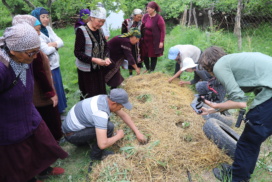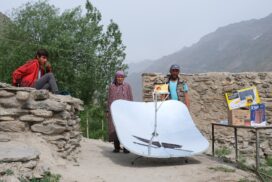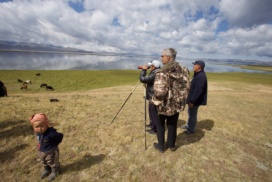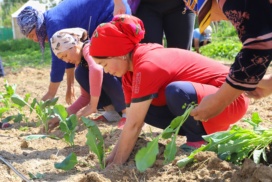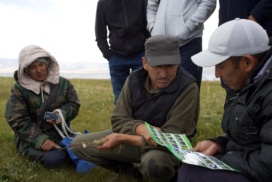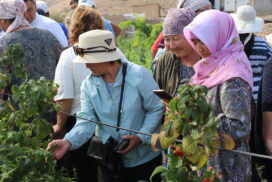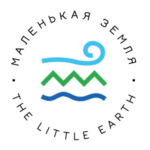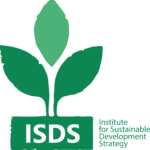Environment and climate

Central Asia is already being severely affected by disruptive climate change and many other ecological problems. It is one of the hardest hit regions in the world with a disturbing outlook for the future; unless coordinated, long-term and systemic action takes place in the coming years (i.e. environmental protection and conservation, ecosystem restoration, and various adaptation efforts). Central Asia is experiencing ecological impacts such as loss of biodiversity, extreme weather events, drought, melting glaciers, desertification, loss of sustainable livelihoods, water/land/soil issues, pollution and so on.
The governments in Central Asia are not sufficiently tackling the ecological crisis. Governments are basically continuing a business-as-usual approach that exacerbates many environmental baselines. Additionally, there are problems in the Central Asian civil society within this thematic area; such as lack of knowledge, obsolete paradigms, tokenistic/inefficient interventions, urban bias, limited resources and lack of donors supporting meaningful grassroots ecological interventions. For vulnerable rural communities there are challenges in terms of weak knowledge about environmental systems, poverty, dependence on mono cultures, limited skills and know-how, forgetfulness of ecological (often pre-soviet) traditions etc., which complicates work in this thematic area on the local level.
Our areas of work
CLIMATE ADAPTATION
-
- Increase knowledge about the effects of climate change and other ecological impacts within vulnerable rural communities; and strengthen community planning and adaption from a long-term perspective.
- Introduce specific methods of climate adaptation that strengthen community resilience, self-sufficiency and autonomy – i.e. permaculture, food and energy sovereignty, local water systems, land rights and (re-)introduce indigenous and strategic crops.
- Support the creation of sustainable livelihoods based on ecological and regenerative principles that facilitate adaption for families and communities.
ECOSYSTEM RESTORATION AND ENVIRONMENTAL PROTECTION
- Increase ecological literacy among community members, including specific approaches on how to protect, preserve and restore local ecosystems.
- Support local interventions and broader efforts that actively work to restore degraded ecosystems in Central Asia, i.e. soil building practices, biohumus production, water retaining landscapes, introducing functional species and strengthen biodiversity.
- Support community-led initiatives aiming to protect and preserve local flora, fauna and ecosystems, i.e. establish micro-reserves to protect key species and ecosystems at risk, create systems for monitoring and evaluating levels of local biodiversity, and re-introduce and institutionalize traditional, ecological forms of tending the land such as using a rotation system for pasture grazing.
AWARENESS RAISING, COLLABORATION AND ADVOCACY
- Strengthen the general level of awareness related to this thematic area among Central Asian audiences, through campaigns, lectures, social media and publications.
- Support networks and alliances of environmental CSOs in Central Asia to enable regional collaboration, joint interventions, capacity building and learning processes, campaigning and advocacy.
- Advocate decision-makers in Central Asia to implement improved ecological policies in several areas (climate adaptation, protection and conservation measures etc) and increasingly and meaningfully involve vulnerable / affected communities in these political processes.
Our target groups

Rural communities

Women

Youth

Decision-makers
Our local partners
Related videos
A video created by our partner organization El-Too summarizing the three years of our partnership in spreading permaculture in Naryn and Issyk-Kul regions of Kyrgyzstan.
A clip created by our partner ISDS about the current state of the lake Son-Kul and adjacent territories, as well as about the problems of that area.
A video about the festival organized by ISDS to get the community involved in preserving Lake Son-Kul’s ecosystem and spreading awareness about challenges to migratory bird habitats.
Explainer clip focused on the issue of water scarcity in Central Asia.
Explainer clip dedicated to climate change in Central Asia.


